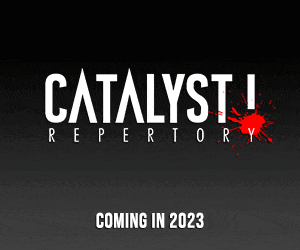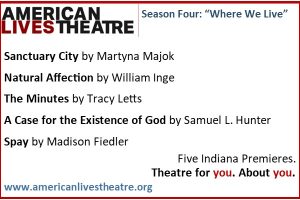An important advantage of publishing my blog on my own website, is the freedom I have to write about anything I choose to instead of covering an assignment picked by an editor of a publication or a website. I also don’t have to be concerned about the appearance of conflict of interest. For me, that last factor is critical, because I wear many professional hats. They include journalist, television contributor, video/film director and producer. Engaged in myriad professional pursuits throughout my career, intersection has often occurred. That sometimes makes promotion of my various activities a tricky prospect. But now that I have my own platform it makes it much easier for me to communicate about my various projects without fear of compromise.
Most recently I added theatre playwright, lyricist and director to my vitae when I co-created “Calder, The Musical.” It is an original work which previewed at the 2016 IndyFringe Theatre Festival in August and was the number #1 best-selling show of over 50. It was also presented as a world premiere full production that sold out six of nine performances Jan. 25 – Feb. 12, 2017, at IndyFringe Basile Theater.
In December of 2015, I became acquainted with Dustin Klein, a 15-year choir director and theatre teacher at The Orchard School, a highly touted, private, progressive school in Indianapolis, Quickly becoming friends, because of our mutual interest in the performing arts, there was no hesitation about collaborating when we both became inspired by a children’s book on American artist, Alexander Calder. Agreeing that a musical about Calder would be appealing, we decided to create an original work that traced the sculptor’s fascinating life. Eventually Dustin would be the show’s composer, co-writer, co-producer. music director and accompanist.
Which leads me to this opportunity I am affording Dustin to convey his insights regarding our shared artistic journey. Recently we sat down at Dustin’s home to revisit “Calder, The Musical,” and discuss its impact on those who experienced it and on he himself.

Dustin Klein – Courtesy of Tom Mueller. Used by permission.
Now that the dust has settled, what are your thoughts about the entire experience?
I feel very proud of what we accomplished in terms of what we wrote, the hours spent creating it , all the contacts made and funds we raised, in order for our original work to be successful. Looking back, I often think “Did we really do that? Did that really happen?” I miss those special moments, for instance, when the kids sang the songs that I wrote. Any writer will tell you that nothing compares with the magic of live performance featuring something you created.
What drove you?
As you know, it has always been a dream of mine to write a musical. As a little kid, I would write and produce shows. And of course, I had to star in them too. When it’s a dream from when you were a child, it’s something that really drives you. Simply doing what you love and enjoy is also a catalyst.
Since you were not a fan of modern art prior to the show, did the project give you a new appreciation of it?
Absolutely. I have a whole new view of modern art. Being an artist, I have always appreciated it but this experience has given me a whole different perspective. Last summer I saw a Calder mobile at the Neiman Marcus department store in Chicago. I really took in the beauty of its movement and was totally transfixed by it. I saw his work in way that I had never seen it before. That was the moment I was inspired to write the “Mobile Ballet” instrumental in the show. Up until that time I hadn’t really felt connected to Calder’s art.
What was it like working on the script?
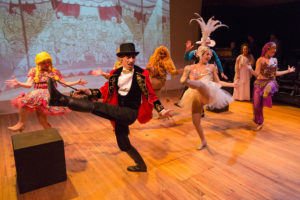
“Calder, The Musical” – Courtesy of Zach Rosing. Used by permission.
The script was probably the most challenging part. Although I have written scripts for children’s plays, I have never considered myself a writer. Writing a musical was very daunting. Half of it is music, which, however, is obviously my niche. But because you and I were able to bounce ideas off each other and because we have seen enough theater between the two of us, we were able to figure out what works. Also, our individual personal experience entered into it a lot, too.
What were the most frequently asked questions regarding the music from those who saw “Calder?”
Does the music come first or the lyrics? People always ask that particular question. I have seen a lot of interviews where song writer duos say “Sometimes the music comes first, sometimes it’s the lyrics.” You and I worked both ways but eventually we discovered that having the lyrics first and then adding the music to it, flowed better.
Did writing to lyrics expand your artistry?
Absolutely. Initially it was intimidating, though. It meant trusting you, the lyricist. I tried to view the lyrics as if they were like a little story. I’m pretty good at absorbing stories and creating a musical world around them. I can picture them in my mind and the music just comes out. I think that works well.
How do you come up with your melodies?
I don’t know. I am sure if you ask any composer, they would say the same thing. They just flow from your being.
Isn’t that what you would call your talent or gift? It is not really something you can describe or define, right?
Exactly. You can’t really explain it. It comes out of your being when you are feeling inspired by a story or feelings. I used to write songs on my own, just for fun. Sometimes when I was feeling sad I would sit down at the piano and express myself. It was like therapy. Often times when I go see a show or a musical I am inspired and I want to go to the piano and express some reaction to it.
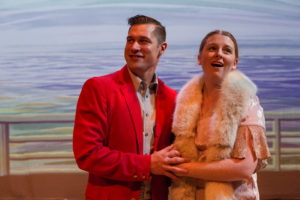
Logan Moore & Katie Schuman – Courtesy of Zach Rosing. Used by permission.
Who are your musical influences?
Over the years, it has been a lot of people. When I was a kid I listened to records my mom played. They were standards, sung by entertainers like Frank Sinatra, Barbra Streisand and Barry Manilow , singer-songwriters and also Broadway musicals. I am really inspired by Alan Menken and his catchy melodies.
How do you define catchy?
You know…people saying “Oh, I just couldn’t get that song out of my head after the show,” or “The next day I was singing it.” Or “It made me feel something” or ”It made me feel the power of that moment.”
What are your favorite musical genres?
When I studied music in music school, much of it was classical. I would say classic composers such as Debussy and Beethoven. They were big. Some intervals I write are very similar to those of Debussy. And also Gershwin. I love Gershwin and Jewish composers in general. Kander & Ebb who did “Chicago.” I love their work. Gosh, there are so many good composers. It is hard for me to think of all of them.
Do you borrow from all the musicals stored in your head?
Throughout my life, whenever I go to a show I love the feeling I get during those magical moments when I feel goosebumps from bring excited or inspired. I always look at the audience and am aware of what works musically for them, because that is my area. I have always studied the audience to see their reaction. I don’t copy others but am influenced by the the greats and try to reposition their work in my music.
Do you remember the very first “Calder” vocal rehearsal for Fringe and how that felt?
Of course. To hear all those 16 voices, singing my songs back at me was incredible.
How did it feel to hear to hear your music during the first performance?
There is always something that happens in a live performance. Things just go up a notch. It’s really neat. I can’t explain how that happens but to hear the audience’s reaction, when they clap or laugh or are fixed on the action is amazing. I am thinking of one moment in particular. There is a sweet reprise in “Prize in The Sky” that was included in the full production. Reprises are included in many musicals but it was neat to see the audience glued in on that and reacting to it. I heard some sighs as the performers sang the little love song they heard earlier. That’s an example.
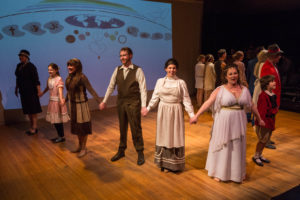
“Calder The Musical” – Courtesy of Zach Rosing. Used by permission.
What was most common feedback you received about the show?
That it was better than expected. In the beginning, I was not sure whether that was a compliment or not. Those who saw the show would say “Oh, I loved that song or this song.” Or you would hear people say “Oh, this is going to Broadway, it really has legs, it is going to be just fabulous.” and course, it’s flattering when they say that but it makes you cringe because you think ”Oh, my gosh, that is so sweet of you to say but that is quite bit of pressure to put on someone.” Most people do not know what it takes to get a show on Broadway.
Do you agree that our audience demographic was wide and varied?
We had a very wide array of audience members—from individuals who are dance, theater, and music professionals to those who had only attended one or two shows. There were also families with children, as well as seniors. I loved the diversity. I think that’s really uniting.
As a co-creator, what do you feel was your greatest individual accomplishment as it pertains to “Calder?”
I feel that my greatest accomplishment was composing an entire score of nearly 15 songs. I did have some doubts that I would be able to turn out quality songs of different styles in so little time. I think that the deadlines we set helped to push our abilities and talents quite efficiently. My other accomplishment was simply working hard, non-stop, for a oneand a half year time period that was beset with obstacles. But I was determined to follow the path.
What are your favorite songs in the show?
Although hard to choose, “Por vous,” “Prize in the Sky,” and “Were It Not for Me” are my favorites.
How about audience members? What did they like?
“Path to Follow, ““That’s for Sure,” “Prize in the Sky,” and “Mobile Ballet.”
What, if any, was your biggest disappointment?
I was disappointed that we were not able to retain our entire cast from our Fringe Festival show. It was challenging to re-cast so many people, re-teach the material, and form new bonds. Yet, it all worked out, in that our full production cast members were just as talented as those they replaced. Plus, they showed true commitment to the project.
How has this experience impacted your career?
People see me as more than just a teacher and educator. I am now viewed as an artist by the broader community. I have to admit that is somewhat of a letdown going back to the classroom and teaching which is always rewarding. But it is a different world from performing with adults in live theater and all the excitement that comes with it. It was definitely an adjustment But as far as my professional involvement in theater, our journey as producers isn’t over. It might be a little early to answer how “Calder, The Musical” will impact my career overall, but I plan to keep my eye on the ball. You and I have things to accomplish to get to the next step so it is not as if we are closing a book and putting it on the shelf. There is still a lot of interest in the show so we’ll just have to see what unfolds.
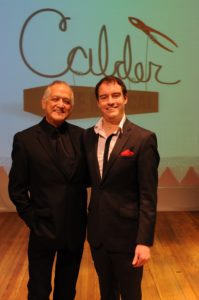
Tom Alvarez & Dustin Klein – Courtesy of Mark Alan Lee. Used by permission.
What’s next for “Calder?
We will keep the momentum going by producing a first rate recording of several of our cast members with me as accompanist. We are producing a demo of select songs, tweaking the script and having the music notated and scored. We are fortunate to have a sponsor, Marianne Tobias, as our music advisor. We are flattered that she feels the music is important enough to be notated. It takes a lot of time in a studio revising and editing. It’s like putting together a script. It is very complex. While mounting our two productions we were always in total production mode. The fundraising that was constant was also very time consuming. Notating the show is also an extra cost. We wanted to put most of our funds into the show. We now have a little pause so that we can get the score notated and have our work copyrighted.
Explain the process of notating.
It’s not like the way Mozart did it, when he wrote out every note. Now you can go into the studio. play the music and it can be scored by computer. After tweaking the script here and there, the scoring and the script need to be put into a book or two books, possibly, so that we can get them published, making it possible to licence our work. We would love to see the shows presented in another market. We are thrilled that it was a success here in Indy but it’s a big world out there and there are a lot of people who may want to see it.
Was co-creating “Calder, The Musical” life changing for you? If so, how?
The experience was life changing in that it was truly surreal to be able to perform my songs live and watch the music come alive onstage before me. It was one of the most rewarding experiences of my life to see singers and dancers performing my compositions and to watch the audience enjoying it all. I also feel that this musical boosted my artistic and business skills and I learned things that I will carry with me for my lifetime.
What advice would you give someone who wishes to create a musical?
My advice would be to build upon a story that you love or that interests you. Then, assemble a team of experienced, talented people who can help you in such an epic feat. It is nearly impossible to do alone, yet singly, one must believe in themselves and pick a subject that they are passionate about. I believe that if you are truly passionate about a story or an idea, then what you create will most likely have purpose, soul, and meaning.
Follow “Calder, The Musical” on Facebook, Twitter, Instagram and Snapchat.



